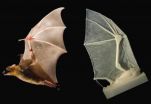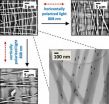(Press-News.org) Researchers have successfully applied a novel method of vaccine creation for Chikungunya virus (CHIKV) using a technique called large scale random codon re-encoding. Using this approach, a group from the UMR_D 190, Emerging viruses Department in Marseille, France in collaboration with the University of Sydney, Australia, demonstrated that the engineered viruses exhibit a stable phenotype with a significantly decreased viral fitness (i.e., replication capacity), making it a new vaccine candidate for this emerging viral disease. This new report publishes on February 21 in the Open Access journal, PLOS Pathogens.
There is an immense need for the development of vaccines targeting many emerging viral pathogens. CHIKV has been responsible for several million human cases over the last decade and represents a striking example of a re-emerging, arthropod-borne, human pathogen for which no licensed vaccine exists. Worryingly, one of the vectors of CHIKV, the mosquito Aedes albopictus, has dispersed into new regions (including temperate areas) resulting in outbreaks of this disease where they had never been previously observed, for example in Italy.
Using the large-scale codon re-encoding method, Antoine Nougairede and colleagues were able to synthetically modify the nucleic acid composition of the virus without modifying the encoded viral proteins. When this method was applied to poliovirus and Influenza A virus, it resulted in a live but attenuated virus that had significant reduction of viral fitness. In contrast with previous studies, which employed a targeted approach of codon re-encoding, this new study demonstrates that a random approach reduced the replicative fitness of CHIKV in both primate and arthropod cells. The employed strategy also prevented the reversion of the attenuated phenotype by mutation or recombination, thus reducing the possibility that the newly created virus strain could evolve back to the pathogenic version.
The findings by Nougairede et al. suggest that large-scale codon re-encoding can provide a strong basis for the rapid design of next-generation viral vaccines against emerging viral pathogens, as soon as their genome sequence has been determined. It represents an exciting route to vaccine development because it intrinsically alleviates the likelihood of novel pathogenic properties of the designed live vaccine, and allows modulation of the amount of reduced fitness by altering the terms and degree of the genetic re-encoding. Thus, this strategy potentially allows for the generic development of live attenuated vaccines against many new viral pathogens, with reduced costs and the potential single dose induction of long-term immunity.
INFORMATION:
FINANCIAL DISCLOSURE: This work was supported by Aix-Marseille University. The funders had no role in study design, data collection and analysis, decision to publish, or preparation of the manuscript.
COMPETING INTERESTS: The authors have declared that no competing interests exist.
PLEASE ADD THIS LINK TO THE PUBLISHED ARTICLE IN ONLINE VERSIONS OF YOUR REPORT: http://dx.plos.org/10.1371/journal.ppat.1003172
(link will go live upon embargo lift)
CITATION: Nougairede A, De Fabritus L, Aubry F, Gould EA, Holmes EC, et al. (2013) Random Codon Re-encoding Induces Stable Reduction of Replicative Fitness of Chikungunya Virus in Primate and Mosquito Cells. PLoS Pathog 9(2): e1003172. doi:10.1371/journal.ppat.1003172
CONTACT: Gina Alvino
(415) 568-3178
plospathogens@plos.org
Disclaimer
This press release refers to an upcoming article in PLOS Pathogens. The release is provided by the article authors. Any opinions expressed in these releases or articles are the personal views of the journal staff and/or article contributors, and do not necessarily represent the views or policies of PLOS. PLOS expressly disclaims any and all warranties and liability in connection with the information found in the releases and articles and your use of such information.
Media Permissions
PLOS Journals publish under a Creative Commons Attribution License, which permits free reuse of all materials published with the article, so long as the work is cited (e.g., Kaltenbach LS et al. (2007) Huntingtin Interacting Proteins Are Genetic Modifiers of Neurodegeneration. PLoS Genet 3(5): e82. doi:10.1371/journal.pgen.0030082). No prior permission is required from the authors or publisher. For queries about the license, please contact the relative journal contact indicated here: http://www.plos.org/about/media-inquiries/.
About PLOS Pathogens
PLOS Pathogens publishes outstanding original articles that significantly advance the understanding of pathogens and how they interact with their host organisms. All works published in PLOS Pathogens are open access. Everything is immediately available subject only to the condition that the original authorship and source are properly attributed. Copyright is retained by the authors. The Public Library of Science uses the Creative Commons Attribution License.
About the Public Library of Science
The Public Library of Science (PLOS) is a non-profit organization of scientists and physicians committed to making the world's scientific and medical literature a freely available public resource. For more information, visit http://www.plos.org.
END
In reef-building corals variations within genes involved in immunity and response to stress correlate to water temperature and clarity, finds a study published in BioMed Central's open access journal BMC Genetics. This information could be used to conserve or rebuild reefs in areas affected by climate change, by changes in extreme weather patterns, increasing sedimentation or altered land use.
A research team led by the Australian Institute of Marine Science, and in collaboration with Penn State University and the Aix-Marseille University, studied DNA variations (Single ...
Bacteria become resistant to antibiotics when stressed, finds research published in BioMed Central's open access journal BMC Evolutionary Biology. In particular E. coli grown at high temperatures become resistant to rifampicin.
It is generally thought that antibiotic resistance is costly to maintain, for example mutations which reduce antibiotic uptake also restrict the amount of nutrients entering the cell. Consequently in the absence of antibiotics non-resistant bacteria will out-compete the resistant ones. However researchers from UC Irvine and Faculté de Médicine ...
What: The U.S. government today released two new documents to guide researchers in carrying out dual use research of concern.
First, the White House Office of Science and Technology Policy today published a draft policy for public comment that proposes to formalize the roles and responsibilities of institutions and researchers when they are conducting certain types of research on specific pathogens and toxins. Researchers are often best poised to understand the potential misuse of the information, technologies and products emanating from their research and to propose ...
Many nations battling malaria face an economic dilemma: spend money indefinitely to control malaria transmission or commit additional resources to eliminate transmission completely. A review of malaria elimination conducted by researchers at the Johns Hopkins Malaria Research Institute and other institutions suggests stopping malaria transmission completely has longlasting benefits for many countries and that once eliminated, the disease is unlikely to reemerge over time. Furthermore, total eradication of malaria may not be necessary before countries that eliminate the ...
Boston, MA — The large antiretroviral treatment (ART) scale-up in a rural community in KwaZulu-Natal, South Africa, has led to a rapid and dramatic increase in population adult life expectancy—a gain of 11.3 years over eight calendar years (2004-2011)—and the benefit of providing ART far outweighs the cost, according to new research from Harvard School of Public Health (HSPH).
While previous studies have shown that ART significantly improves survival in clinical cohorts of HIV patients receiving ART, this is the first study to directly measure the full population-level ...
Evidence from Siberian caves suggests that a global temperature rise of 1.5 degrees Celsius could see permanently frozen ground thaw over a large area of Siberia, threatening release of carbon from soils, and damage to natural and human environments.
A thaw in Siberia's permafrost (ground frozen throughout the year) could release over 1000 giga-tonnes of the greenhouse gases carbon dioxide and methane into the atmosphere, potentially enhancing global warming.
The data comes from an international team led by Oxford University scientists studying stalactites and stalagmites ...
For older adults looking to sharpen their mental abilities, it might be time to log on to Facebook.
Preliminary research findings from the University of Arizona suggest that men and women older than 65 who learn to use Facebook could see a boost in cognitive function.
Janelle Wohltmann, a graduate student in the UA department of psychology, set out to see whether teaching older adults to use the popular social networking site could help improve their cognitive performance and make them feel more socially connected.
Her preliminary findings, which she shared this month ...
Washington, D.C.—Solar geoengineering is a proposed approach to reduce the effects of climate change due to greenhouse gasses by deflecting some of the sun's incoming radiation. This type of proposed solution carries with it a number of uncertainties, however, including geopolitical questions about who would be in charge of the activity and its goals.
New modeling work from Carnegie's Katharine Ricke and Ken Caldeira shows that if a powerful coalition ever decided to deploy a geoengineering system, they would have incentive to exclude other countries from participating ...
VIDEO:
The strong, flapping flight of bats offers great possibilities for the design of small aircraft, among other applications. By building a robotic bat wing, Brown researchers have uncovered flight secrets...
Click here for more information.
PROVIDENCE, R.I. [Brown University] — Researchers at Brown University have developed a robotic bat wing that is providing valuable new information about dynamics of flapping flight in real bats.
The robot, which mimics the wing ...
Researchers from North Carolina State University have developed a way to melt or "weld" specific portions of polymers by embedding aligned nanoparticles within the materials. Their technique, which melts fibers along a chosen direction within a material, may lead to stronger, more resilient nanofibers and materials.
Physicists Jason Bochinski and Laura Clarke, with materials scientist Joe Tracy, placed specifically aligned gold nanorods within a solid material. Gold nanorods absorb light at different wavelengths, depending upon the size and orientation of the nanorod, ...


